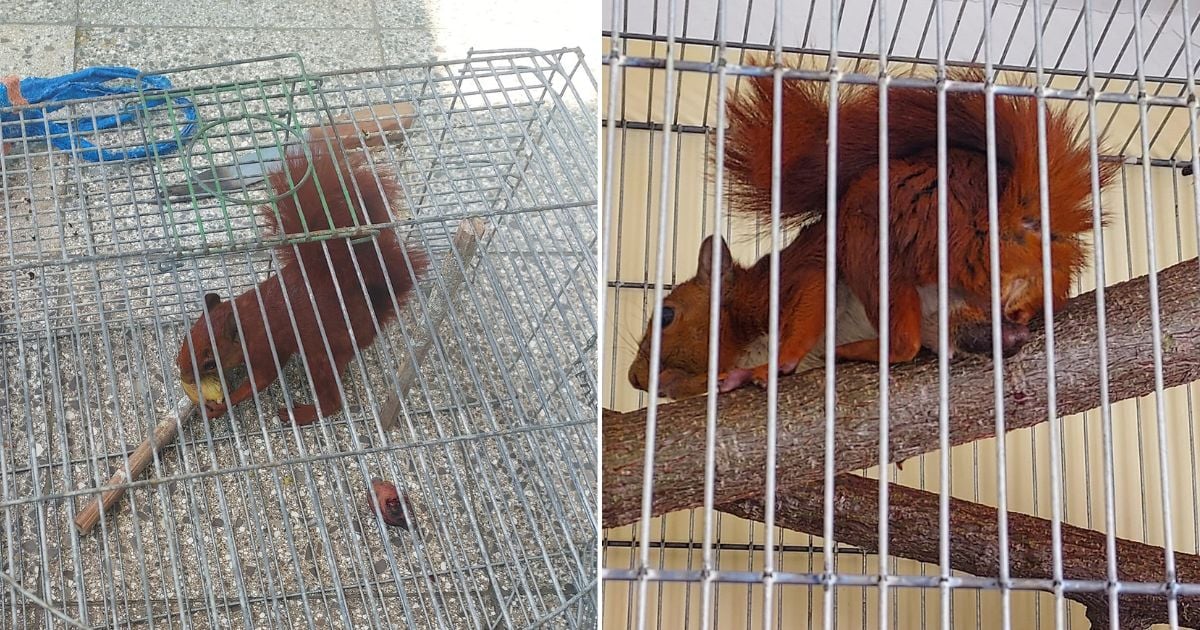
An animal protection advocate criticized the actions of Cuban institutions responsible for nature conservation this Sunday, expressing her outrage at the promotion of red squirrel sales in Havana.
In a Facebook post, Elizabeth Marela Cardoso Pérez strongly criticized sellers who, in her view, profit from the suffering of animals without any knowledge of their management and care.
"This type of post brings me great sadness regarding the animals, and at the same time, immense indignation towards those good-for-nothings who profit from the suffering of these species," she wrote, emphasizing that buyers also share responsibility for acquiring these animals out of mere vanity or ignorance of their well-being.
"They have no clue how to manage them, because all they care about is the money they can make," she expressed with great indignation.
The activist went further, pointing out that not only sellers and buyers are to blame but also the institutions responsible for wildlife protection, whom she accused of failing to fulfill their duties: “Where is Flora and Fauna? This is public, and they do nothing,” she denounced, emphasizing the lack of action from the authorities to control species trafficking.
Additionally, he lamented that the existing reporting mechanism is ineffective, describing it as "unbearable and inoperative."
Cardoso also criticized the bureaucracy that allows criminals to operate unchecked, noting that the lack of officials committed to the protection of wildlife and nature only exacerbates the situation, while the animal rights community feels increasingly vulnerable.
Along with her strong criticism, the woman shared some screenshots of posts circulating on social media that promote the sale of red squirrels.
“Pet lovers. I have very cute red squirrels for your home. I’m from La Havana, Lawton. Interested parties, please DM,” says one of the ads posted by the user Jose Canitrot.
The same person, as seen in another screenshot, announced they were looking for someone who specialized in hunting red squirrels in the Puente Grande area: “I’ll buy them all,” they noted.
Another Facebook profile, under the name China MI, reported in the group "SOS callejeros. Cuba" that Jose Canitrot himself made a post promoting the sale of this species.
The shared images show several cages containing red squirrels.
Red squirrels are an invasive species that have also found people who enjoy watching them in the wild, as seen in a video shared by the news portal CubaNet.
However, the current economic crisis has led many people to seek income through unusual means, such as the trade of wild animals or invasive species.
In 2021, animal rights activist in Cuba, Javier Larrea, reported on his Facebook profile the alleged sale of a bat on the island for the price of 4,000 pesos.
Another activist, Beatriz Batista, reported in 2020 the sale of an owl for religious purposes on the classified platform Revolico: “The longer we ignore this absurdity and become complicit in the exploitation of lifeless animal bodies... the more we develop as an ignorant and cruel society,” she said.
In 2021, the Office of Environmental Regulation and Security in Cuba reported an increase in the illegal trade of wild birds, as well as other species.
According to the state media Cubadebate, the demand for these species is driven by their use as pets, the consumption of their meat, the creation of handicrafts, and certain religious practices.
Although the Cuban regime enacted the Animal Welfare Decree Law in 2021, the continual reports from citizens highlight its limited effectiveness in practice.
Specifically, Article 58, section h) states that it is an offense to "market, transport, possess, capture, breed, and any other action involving the management of animals that is carried out in violation of current regulations."
Additionally, Article 83 states that the management of wildlife populations can be carried out for justified health reasons, such as excessive growth of individuals of a species, the presence of invasive species or pests, and diseases.
However, the culling of these invasive species requires authorization from the relevant authorities and must be carried out quickly and compassionately.
The Animal Welfare Decree-Law of 2021 in Cuba establishes strict regulations regarding the trade of live animals, including invasive species. According to this law, individuals engaging in the commercialization of animals must possess the necessary licenses and authorizations in accordance with current legislation.
Individuals who commit these violations may face fines of up to 1,000 pesos, which would be imposed by the relevant authorities.
One of the most criticized aspects by activists is the leniency of the Animal Welfare Law regarding offenses that impact animals, including invasive species.
Filed under: